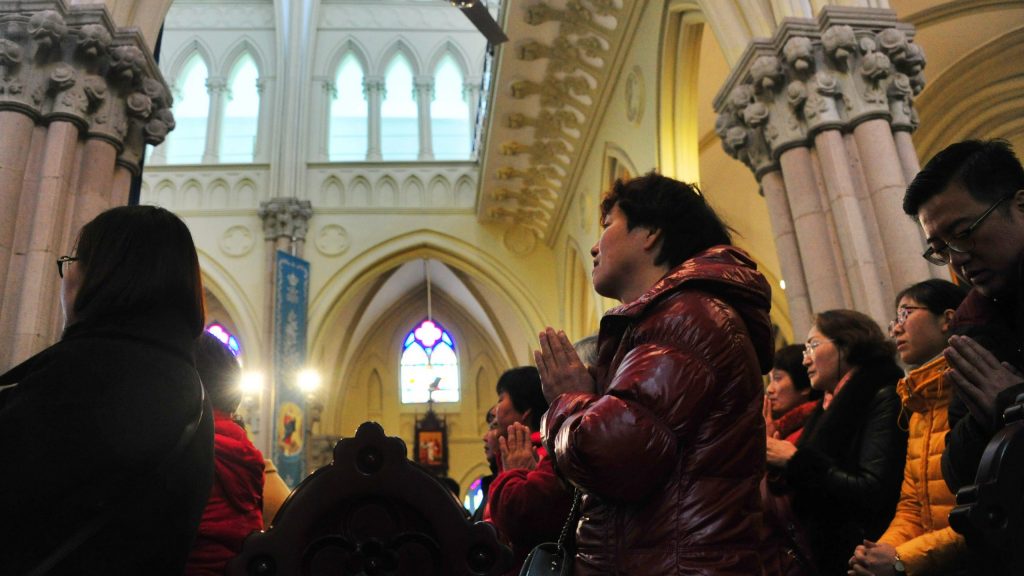A new U.S. government report says that human rights abuse in China has worsened in the last year, and specifically highlighted the escalating persecution of Chinese Catholics in the wake of the Vatican-China agreement of 2018.
“During its 2019 reporting year, the Congressional-Executive Commission on China found that the human rights situation has worsened and the rule of law continued to deteriorate, as the Chinese government and Party increasingly used regulations and laws to assert social and political control,” stated the commission’s annual report, released on Wednesday.
The report said that “After the PRC Ministry of Foreign Affairs signed an agreement with the Holy See in September 2018 paving the way for unifying the state-sanctioned and underground Catholic communities, local Chinese authorities subjected Catholic believers in China to increasing persecution by demolishing churches, removing crosses, and continuing to detain underground clergy.”
The report’s time frame covers human rights in China from August 2018 to August 2019. The commission was established by Congress in 2000, as China was set to enter the World Trade Organization, to report on human rights in the country and to maintain a database of political prisoners.
Wednesday’s report notes the rise of mass internment camps in the country’s western Xinjiang province, the brutal persecution of Christians, Muslims, and other unregistered churches or religious groups, and repression of pro-democracy protesters in Hong Kong.
The Chinese Communist Party’s five year “sinacization” plan is underway to establish state control over religion. “Scholars and international rights groups have described religious persecution in China over the last year to be of an intensity not seen since the Cultural Revolution,” the report said.
And China is reportedly ramping up stricter controls on religious groups and events in 2020.
New restrictions set to be enforced in February include mandates that religious groups “adhere to the directives on religions in China, implementing the values of socialism” and promote the “principles and policies of the Chinese Communist Party.”
Another article “requires that the government authorities be involved in the selection of religious officers and involved in disputes.” Underground churches or “home” churches are outlawed.
The 2018 Vatican-China agreement on the appointment of bishops aimed to bring about the unification of the state-sanctioned Chinese Catholic Patriotic Association and the underground church in communion with Rome. Instead, persecution of the underground church has continued and, according to some, intensified.
The number of Catholics in China is estimated to be more than 10 million, the report said, with official statistics saying that 6 million Catholics are part of the state-sanctioned church.
“Observers and Catholic believers expressed concern that the agreement did not provide sufficient support for the Chinese Catholic community, with one scholar pointing out that the authorities’ persecution of both underground and official Catholic communities has actually intensified over the last year under the ‘sinicization’ campaign,” the report found.
“In spring 2019, authorities detained three underground priests of Xuanhua diocese in Hebei province.”
“Local Chinese authorities subjected Catholic believers in China to increasing persecution by demolishing churches, removing crosses, and continuing to detain underground clergy,” the report said.
One of the report’s recommendations to Congress is for members to advocate for “the right of Catholics to be led by clergy who are selected and who conduct their ministry according to the standard called for by Catholic religious beliefs.”
The Chinese government’s treatment of other religious communities was also highlighted by the report.
In the Xinjiang Uyghur Autonomous Region in the country’s far west, “the Commission believes Chinese authorities may be committing crimes against humanity against the Uyghur people and other Turkic Muslims,” with estimates at “one million or more Uyghurs” detained in internment camps and reports of forced labor in the camps.
“Security personnel at the camps subjected detainees to torture, including forced ingestion of drugs; punishment for behavior deemed religious; forced labor; overcrowding; deprivation of food; and political indoctrination,” the report said. Due to overcrowding, some detainees were sent to camps elsewhere in China; some “reportedly died in camps due to poor conditions, medical neglect, or other reasons.”
There were reports of “the use of electric shocks and shackling people in painful positions” in camps.
Elsewhere in the region, authorities have set up “a pervasive and high-tech surveillance system” with facial recognition cameras and cell phone monitoring, as well as biometric data collection of members of ethnic minorities.
While Muslims have been subject to strict controls on religious practice in the region, the purported “anti-terrorism” measures of the government might be used elsewhere in the Ningxia Hui Autonomous Region (Ningxia) where many Hui Muslims reside, the report noted.
Both the House and the Senate have passed legislation, the Uyghur Human Rights Policy Act, to provide more reporting to the federal government on the human rights abuses committed against ethnic minorities in Xinjiang and the transfer of technology to enable mass surveillance.
The two bills must be reconciled before a final vote to send the legislation to the President’s desk, which members of the commission promised would happen in 2020.

